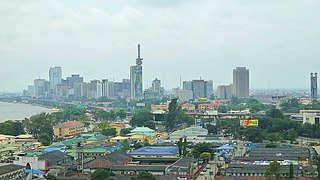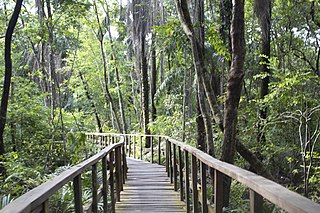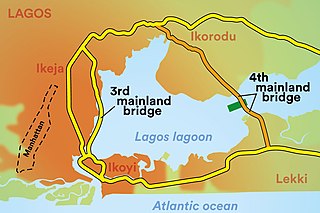Related Research Articles
Nigeria’s transport network has expanded in recent years to accommodate a growing population. The transport and storage sector was valued at N2.6trn ($6.9bn) in current basic prices in 2020, down from N3trn ($8bn) in 2019, according to the National Bureau of Statistics (NBS). This was reflected in a lower contribution to GDP, at 1.8% in the fourth quarter of 2020, down from 2.1% during the same period the previous year but higher than the 0.8% recorded in the third quarter of 2020. One of the most significant challenges facing the sector is meeting the needs of both large coastal cities and rural inland communities in order to fully unlock the country’s economic potential. This is especially the case with mining and agriculture, both of which are expected to benefit from two large-scale projects: the Lekki Port in Lagos and the Kano-Maradi rail line in the north of the country.

Lagos, or Lagos City, is a large metropolitan city in southwestern Nigeria. With an upper population estimate of 21 million, it is the largest city in Nigeria, and the most populous urban area on the African continent. Lagos was the national capital of Nigeria until the government's December 1991 decision to move their capital to Abuja in the centre of the country. Lagos is a major African financial centre and is the economic hub of Lagos State and Nigeria at large. The city has a significant influence on commerce, entertainment, technology, education, politics, tourism, art, and fashion in Africa. Lagos is also among the top ten of the world's fastest-growing cities and urban areas. A megacity, it has the fourth-highest GDP in Africa, and houses one of the largest and busiest seaports on the continent. Due to the large urban population and port traffic volumes, Lagos is classified as a Medium-Port Megacity.

Lagos State is a state in southwestern Nigeria. Of the 36 Nigerian states, it is the second most populous state but the smallest in area. Bounded to the south by the Bight of Benin and to the west by the international border with Benin for 10 km, Lagos State borders Ogun State to the north for about 283 km, making it the only Nigerian state to border only one other state. Named for the city of Lagos—the most populous city in Africa—the state was formed from the Western Region and the former Federal Capital Territory on 27 May 1967.

Murtala Muhammed International Airport (MMIA) is an international airport located in Ikeja, Lagos State, Nigeria, and is the major airport serving the entire state. The airport was initially built during World War II and is named after Murtala Muhammed (1938–1976), the fourth military ruler of Nigeria.

Victoria Island (VI) is an affluent area that encompasses a former island of the same name neighbouring Lagos Island, Ikoyi and the Lekki Peninsula by the Lagos Lagoon. It is the main business and financial centre of Lagos State, Nigeria. Victoria Island is one of the most exclusive and expensive areas to reside in Lagos. The town and island lie within the boundaries of the Eti-Osa Local Government Area (LGA).

Lagos State University, popularly known as LASU, is a Lagos state government-owned university established in 1983. Its main campus is situated at Ojo, with sub-campuses at Ikeja and Epe. The university was set up "for the advancement of learning and establishment of academic excellence". The university caters to over 35,000 students. The university was established during the administration of Late Lateef Kayode Jakande. The university offers diploma, degree and post graduate programmes, including an MBA programme. LASU was ranked among the top 600 universities in the world by the Times Higher Education World University Rankings for 2020. On 23 June 2021, LASU emerged as the best young university in Nigeria having been below the age of 50 years to be added. Times Higher Education ranked the Lagos State University as the second best university in Nigeria on 2 September 2020, and was the only state university included in the rankings for 2022. The university has attracted international funding, including for the establishment of a World Bank Group Africa Centre for Excellence on Science, Technology, Engineering, and Mathematics.
Lekki Lagoon is a lagoon located in Lagos and Ogun states in Nigeria. The lagoon lies directly to the east of Lagos Lagoon and is connected to it by a channel. It is surrounded by many beaches.

Epe is a town and Local Government Area (LGA) in Lagos State, Nigeria located on the north side of the Lekki Lagoon and about 90 km from Ibadan. During the 2006 Census, the population of Epe was approximately 181,409.

Ibeju-Lekki is a local government area of Lekki, Lagos State, Nigeria. The administrative centre was formerly at Akodo and was later moved to Igando Oloja due to the creation of the Lekki Council Development Area. The name of the Local government was derived from two autonomous communities, Ibeju and Lekki.
FMA Architects Ltd is an international architecture, planning and interior design firm headquartered in Lagos, Nigeria.

Lekki is a city in Lagos State, Nigeria. It is located to the south-east of Lagos city. Lekki is a naturally formed peninsula, adjoining to its west Victoria Island and Ikoyi districts of Lagos, with the Atlantic Ocean to its south, Lagos Lagoon to the north, and Lekki Lagoon to its east; however, the city's southeast, which ends around the western edge of Refuge Island, adjoins the eastern part of Ibeju-Lekki LGA.
Transport in Lagos currently consists of four modes: road, water, rail and air.

Lekki Conservation Centre (LCC) is a 78-hectare (190-acre) Natural Resource Conservation in Lekki, Lagos State Nigeria. It is part of PARCC West Africa project.
Victoria Garden City (VGC) is a gated community (estate) off Lekki Epe Express Way, ikota Lekki, Lagos Lekki area, Lagos State. It spans approximately 200 hectares and serves as a residential, commercial and public service area. It is owned and operated by HFP a construction company. It is privately owned with an urban growth rate of between 16% and 18%.

The Fourth Mainland Bridge is a 38 km long bridge project by the Lagos State Government, Nigeria, connecting Lagos Island by way of Langbasa(Lekki) and Baiyeku(Ikorodu) across the Lagos Lagoon to Itamaga, in Ikorodu. The bridge is a 2 × 4 lane carriageway cross-sectional road with permission for BRT Lane and future road contraction. It is expected to become the second longest Bridge in Africa, featuring 3 toll plazas, 9 interchanges, 4.5 km Lagoon Bridge and an eco-friendly environment amongst other added features. The idea was conceptualized by the government of Senator Bola Ahmed Tinubu, former governor of Lagos State. Construction was planned to commence in 2017, 50 years after the state's establishment and 26 years after the completion of the Third Mainland Bridge by the ex-military President Ibrahim Babangida and was expected to be completed by 2019, but construction has not been started as of November 2023. The project was to cost the state an estimated sum of ₦844 billion in the 2017 budget. In September 2020, the Lagos State Government proposed another sum of $2.2 billion for the construction. 800 houses are expected to be demolished as against the 4,000 earlier marked for demolition in the previous design that was realigned. In April 2021 there were 6 bidders for the US$2.5 billion project. By December the preferred bidder would be known.
'Dayo Adedayo is a British-trained Nigerian documentary photographer, cultural anthropologist, and author. He is the author of Nigeria 2.0, a book that documents the story behind many important places in Nigeria. Within a space of 17 years, Adedayo has travelled and documented 36 states in Nigeria.

The Fish Statue, officially referred to as The Fish, Epe, is a sculpture of two giant fish, erected at Lekki-Epe T-Junction in Epe, Lagos by the Lagos State Government. The sculpture is mounted on a large rectangular plinth with the word "EPE" on its side.

The Lekki–Epe Expressway is a 49.5-kilometre (30.8 mi) expressway connecting the Lekki and Epe districts in Lagos State. The Lekki-Epe expressway was first built in the 1980s. It was built during the Lateef Jakande's administration. It is the second private toll project in Africa. The road construction project was financed by the African Development Bank. The bank provided a loan of up to US$85 million to help fund the upgrade and rehabilitation of the Lekki to Epe expressway in 2008, and it was based on Public-Private Partnership (PPP) under the Design, Build, Operate (DBOT), and Transfer and Rehabilitate, Operate (ROT) framework/business model.
References
- ↑ "Lekki-Epe International Airport New Airport Profile - CAPA". Centre for Aviation. Retrieved 4 August 2019.
- ↑ "Lagos yet to find investors for Lekki Int'l Airport 10 years after". Business Day. 4 March 2019. Retrieved 4 August 2019.
- ↑ "Lekki-Epe International Airport to get $450 million upgrade". Airport Technology. 22 November 2011. Retrieved 4 August 2019.